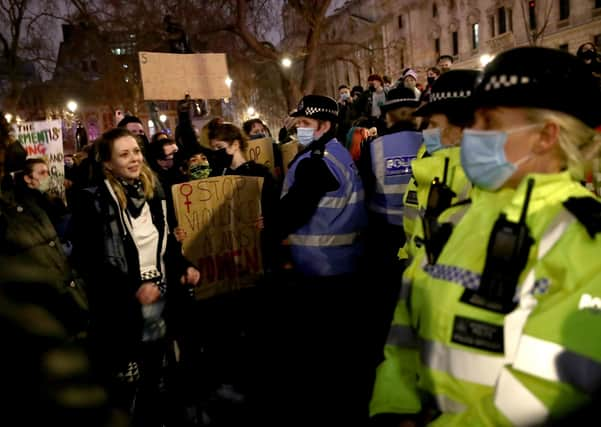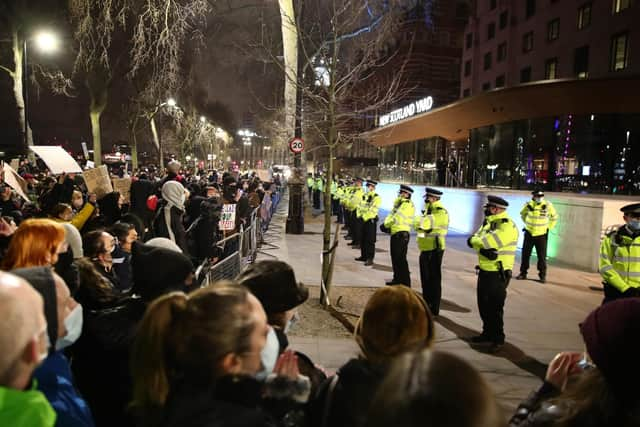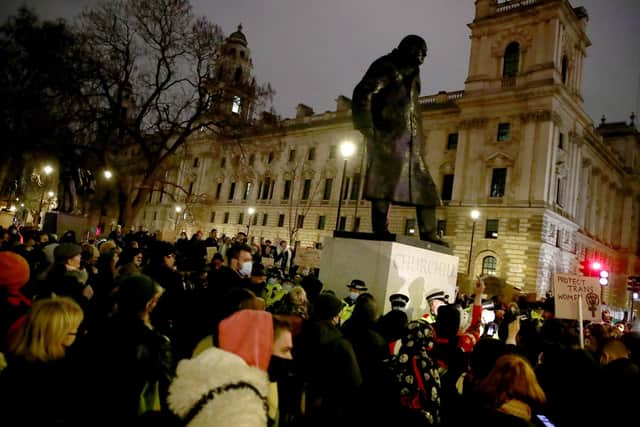Police Bill won’t silence today’s suffragettes – Sarah Wilson


Instead, they fought tooth and nail; smashing windows, chaining themselves to railings and, in Emily Davison’s case, sacrificing their lives for the right to participate in democracy.
Time and again, these women were thrown in prison, tortured and mocked by wider society, yet their protests never ceased. By 1928, they had secured the right to vote on the same terms as men.
Advertisement
Hide AdAdvertisement
Hide AdWhat the suffragettes – and every protest movement before and since – understood was the power of disruption. When, as so often is the case, asking politely just won’t cut it, protest has always been the most effective way for disenfranchised members of society to make their voices heard. And now the Government wishes to curb this.


The new Police Crime, Sentencing and Courts Bill being proposed by the Government takes aim at the very bread and butter of protests: “noise” and “disruption”. If they were protesting today, even the meekest of suffragettes would find themselves falling foul of legislation.
The Bill would see a vast expansion to the police’s powers to restrict and crack down on everything from one-person protests to static, peaceful protests if they are defined as being “seriously disruptive”; a definition to be decided – without Parliamentary scrutiny – by the Home Secretary herself.
The claim is that police need these powers to “take a more proactive approach” to “highly disruptive” protests; yet events from Sarah Everard’s vigil suggest the exact opposite.
Advertisement
Hide AdAdvertisement
Hide AdKicking, shoving and pinning women to the ground in scenes that would, regrettably, be familiar to suffragettes, Met officers at the otherwise peaceful vigil held on Saturday seemed to demonstrate that the issue at hand is not police having too few powers, but police flagrantly abusing the powers that they already possess.


Already, officers have powers to restrict protests at risk of creating “serious public disorder, serious damage to property or serious disruption to the life of the community” under the 1986 Public Order Act. Proposed legislation will simply open the door to any form of protest – no matter how small, no matter how peaceful – being criminalised.
For a government so seemingly concerned with the matter of free speech – even setting out proposals to strengthen it in universities – the Bill poses a dramatic, alarming threat to all of our rights to protest.
One can only conclude that the Government supports free speech insofar as it does not criticise or affect its own interests. Protests outside Parliament – like those by women on Sunday – will be banned, while the Government will itself decide what kind of assembly counts as “seriously disruptive”, and thus is unlawful.
Advertisement
Hide AdAdvertisement
Hide AdGiven many protests centre at least partially on government policy, inaction or failings, the new legislation practically amounts to asking the Government permission to protest against the Government.
The measures will, in effect, stop protest from doing what it needs to do: be loud, visible and at least a little disruptive. The police will be handed powers to place time limits on demonstrations, as well as determining noise levels, lest a protest should – God forbid – attract any attention.
New lengthy prison sentences of up to 10 years, meanwhile, could be handed out to peaceful protesters if they’re deemed to have caused “serious annoyance”.
Such measures wouldn’t seem out of place in authoritarian regimes around the world, yet the Government insists, on its protest fact sheet, that the Bill will not affect our “cornerstone” right to freedom of expression.
Advertisement
Hide AdAdvertisement
Hide AdIts hope, perhaps, is that the public will accept long-term curbs on their freedom after a year in which police have already been handed unprecedented powers over our everyday lives.
For those who have never protested, these changes may feel irrelevant – yet there’s no telling when a change in circumstances might leave you with no other option but to take to the streets.
One doesn’t have to agree with protesters, therefore, to see this legislation for what it is: a profound attack on all of our rights, present and future, to challenge those in power and push for change.
Sarah Wilson is a senior digital journalist with JPI Media and The Yorkshire Post.
Advertisement
Hide AdAdvertisement
Hide AdSupport The Yorkshire Post and become a subscriber today. Your subscription will help us to continue to bring quality news to the people of Yorkshire. In return, you’ll see fewer ads on site, get free access to our app and receive exclusive members-only offers. Click here to subscribe.
Comment Guidelines
National World encourages reader discussion on our stories. User feedback, insights and back-and-forth exchanges add a rich layer of context to reporting. Please review our Community Guidelines before commenting.